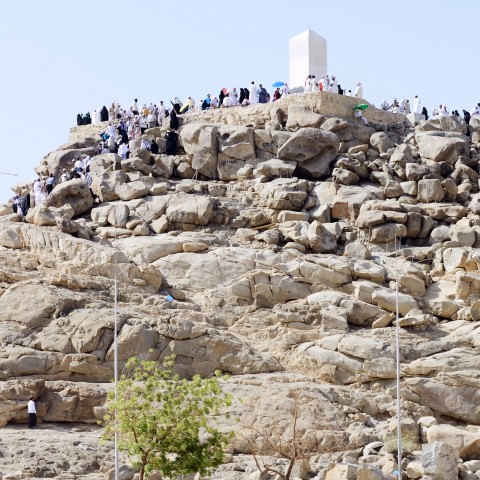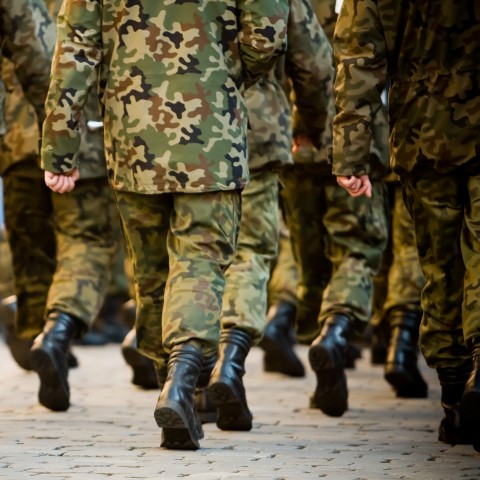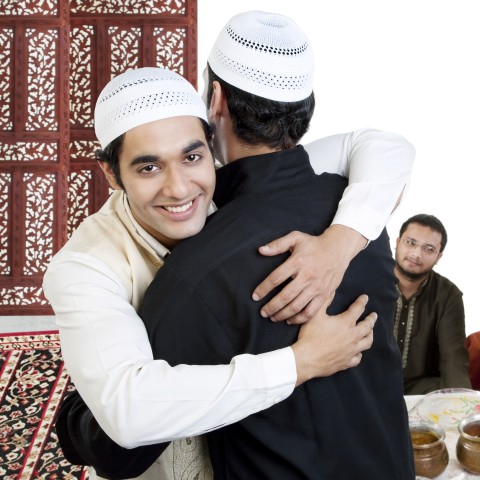
If you tie up an Arab’s hands while he’s speaking, you might as well have tied up his tongue.
So goes an old saying about the importance of body language in Arab cultures. And there’s a lot of truth to it, which is why we’re going over UAE etiquette in today’s article.
It doesn’t matter how many times you’ve repeated after your teacher or your textbook to nail the perfect Arabic accent. If you aren’t aware of how your body language impacts your communication, you’ll stick out as a foreigner at best—and actually impede your meaning at worst.
Of course, there are many different “Arab cultures” out there, and each one is going to have slight differences in what’s considered normal in terms of gestures when speaking.
But there are several key things to keep in mind, both in terms of what you should do and what you should try to avoid. These rules for body gestures in Arabic cultures tend to be applicable no matter where you go.
In this guide, you’ll get a glimpse at some of these subtle nuances in body language and gestures in Arabic cultures, and by taking them to heart, you’ll be all set to enjoy truly seamless communication in the Arab world! Start with a bonus, and download your FREE cheat sheet – How to Improve Your Arabic Skills! (Logged-In Member Only)
Table of Contents
- Interesting and Indispensable Gestures and Body Language in Arab Culture
- Things You Shouldn’t Do
- Conclusion

1. Interesting and Indispensable Gestures and Body Language in Arab Culture
1- The Right-Hand Rule
No, you’re not back in calculus class. In fact, this is a cultural rule in tons of places all over the world, not just Arab cultures.
The idea is that your right hand (or both hands) should be used for everything, whenever you have a choice.
Why’s that? Some kind of obscure discrimination against the left-handed among us?
Not exactly. It’s just that the left hand is associated with using the toilet. Traditionally, in a lot of cultures, you save the left hand for that less-than-clean purpose.
So that’s where everyone’s mind goes when you stick out your left hand to do anything, from giving a high five to accepting a contract.
If you happen to be left-handed, make an effort to use your right hand for giving and receiving things as much as possible. That’s the bare minimum of respect-the-right-hand that you should try to achieve.
2- Smiling

Who doesn’t love a big ol’ smile to ease the mood?
Actually, in different places around the world, smiling can mean very different things. Americans tend to wear a smile, practically as their default expression, whereas in East Asia, a smile can show that you’re uncomfortable and want to change the subject.
Big grins are an important part of creating a friendly personal relationship in the West. In Arab countries, though, it’s likely to come across as insincere.
People also tend not to smile or wave at strangers on the street.
This doesn’t mean that you have to give up your smiling habit entirely. Just be aware that the “standard” for smiling is a bit higher in other places, and it might not be returned with the same enthusiasm.
3- Handshakes

Let’s dive a little deeper into what you can do with your hands, specifically in terms of Arabic greeting hand gestures.
In the West, handshakes are for introductions and greetings (though lots of people nowadays hug each other, which we’ll get to shortly). If you see someone several times a day, it would be quite strange to shake their hand every time, right?
In Arab culture, you not only shake hands every time you see someone, you do it every time you leave, too!
It’s important to note here that many Muslim women are uncomfortable with being touched by men. And if you’re a woman visiting an Arab country, being forward with handshakes might be taken the wrong way.
To stay on the safe side, you can touch your right palm to your heart in lieu of a handshake, or simply wave hello.
This palm-to-the-heart gesture is actually done by default after the handshake.
4- Man Hugs & Holding Hands

Nobody ever called Arab men distant or unaffectionate.
It’s perfectly common in Arab culture for two men to walk down the street hand-in-hand, or to give each other a friendly hug upon meeting. Childhood, teenagerhood, adulthood—even hardened military men will do this.
Arab expressions of masculinity simply don’t restrict touching other men. Try that in the West, though, and a lot of men will look at you funny or even become quite offended.
So what does it mean if an Arab man doesn’t touch you (assuming you’re a Western man)?
One of two things, really. He either doesn’t like you, or he respects your culture enough to know that you probably don’t like to be touched.
And the signal you’re sending by not touching them—pulling away from a handshake early, for instance, or not putting your hand on their shoulder when telling a good joke—is the same in reverse.
You’re subtly implying that they’re not your good friends and that you may, in fact, be made uncomfortable by their presence.
All of this goes right out the window, of course, when we talk about contact between members of the opposite sex. This same-sex touching isn’t affection, it’s friendship.
Affection is culturally regulated much, much more. Public displays of affection are strongly frowned upon, and anything that could be mistaken for an advance probably will be.
Beware that holding hands is only appropriate in actual Arabic countries (Persian Gulf countries). In North African or Levantine countries with Arabic political systems, it’s not appropriate for men to hold hands as it is in countries like the UAE.
5- Kissing on the Cheek

So we’ve covered hugging and handshakes—two very important parts of the first impression.
And yet there’s still one more body language element to Arab greetings that can really be a sticking point for some people: the cheek kiss.
It’s not actually a smack on the cheek. All you do is kiss the air right next to someone’s cheek. Men do this to men, and women do this to women, for the most part.
But the main question is, how many times? And where do you start, right or left?
Unfortunately, some people have grown up starting with the left cheek, but there’s just no way of knowing who these poor souls are.
It’s best to clearly telegraph your intentions and always, always head for the right cheek first, because that’s what most people do. Fingers crossed, you won’t run into any embarrassing mishaps.
6- Measuring Things with Your Arm
Finally, an example that won’t communicate bad intentions or start any international incidents.
In the West, we tend to hold our hands a certain distance apart to say how large certain things are. “The spider was thiiiis big!”
In some Arab countries, people do exactly the same gesture, but in a unique way. They measure things on their left arm instead, marking off the distance from their right hand to their left via the forearm.
Interestingly, different people may mean slightly different things when using the same gesture. Are you measuring from your right palm to your left palm, or to your left fingertips? Ask your friends!
2. Things You Shouldn’t Do
So we’ve covered how certain things might be interpreted differently between Western culture and Arab culture.
But while that kind of anthropology is interesting, it’s probably not exactly why you’re here.
You want to know what might get you in trouble. You want to know about body gestures considered rude in Arabic cultures.
For that reason, the following examples are things you ought to make an effort to avoid as best you can.
Please don’t:
1- Give a Thumbs-Up

Actually, this is really tricky to say. Widespread exportation of Western culture has diluted the meaning of many body gestures that used to be limited to specific contexts.
So no matter what different sources tell you, there will always be people that take things one way and people that take things another.
With the thumbs-up sign, though, the consequences of “getting it wrong” can be more serious than you bargained for.
Believe it or not, more traditional or conservative Arabs won’t take this well at all. To them, it’s something like saying “Up yours!”
Now, as with the other “don’ts” in this article, the fact that you’re a foreigner is probably going to give you charisma points when speaking with others. Using the thumbs-up is, as I mentioned, quite common in international media these days.
Just don’t be offended if someone quietly takes you aside and mentions that you shouldn’t do it around Grandpa.
2- Point at Someone with the Index Finger

Pointing is rude! Even more so if you’re face-to-face with someone and you start jabbing your finger in their face.
Perhaps this one is rude for you as well, so you wouldn’t be caught doing it in the first place. What about when you want to refer to someone, say “that guy over there?”
Simply gesture with your whole hand instead, as if you were showing someone the way to somewhere.
Using the whole hand (the right hand, naturally) removes any suspicion that you’re talking negatively about the other party. It’s almost like a gesture of welcome to join the conversation.
3- Slap Your Fist into Your Hand
This sounds obvious when it’s written out like that. It makes me think of some goon in a trenchcoat lurking in a back alley.
However, I’ve personally seen quite a few Westerners do this gesture when impatiently waiting for something.
Staring off into the distance, they’ll swing their arms back and forth, and usually wind up clapping one fist into the other hand.
It might be a baseball thing—as I said, it’s mostly just Americans who do this.
In North Africa and Morocco specifically, this gesture refers to sexual intercourse.
In any case, no matter how much the Arabs nearby are into baseball, seeing someone punch their own palm tends to make people uneasy. If you’ve got to fidget in some way while waiting, try twiddling your thumbs or adjusting your shirt.
4- Check Your Watch While Talking to Someone

As you can imagine, checking your watch while in the middle of a conversation sends a strong signal that you’re bored and can’t wait to get out of there.
Interestingly, in business meetings, a similar gesture is not uncommon. Checking one’s phone in a meeting and shooting off a quick text isn’t seen as particularly rude in many Arab countries.
Why the difference? The meeting is often a more casual event in Arab society. Using your phone is something that you’d likely have to do regularly during the work day anyway, so taking a few moments to quickly send a message isn’t seen as interrupting any kind of pattern.
On the other hand, looking at your watch is only about knowing how much time is left until something else happens. It certainly happens from time to time, and in a lively conversation with someone you know it will probably be overlooked, but it’s better to avoid this one if you can.
5- Bite Your Finger
You may not have been inclined to bite your finger in the first place. Have you even washed your hands today?
But it’s good to recognize what it means if you ever see it done.
When you take your right index finger and lightly bite down on it (horizontal in your mouth) it’s showing that you can’t stand the situation a minute longer.
Imagine gritting your teeth, but way, way more intense. It’s like you’ve got to bite down on a piece of leather to stop from screaming, and your finger is the first thing that comes to mind.
Your temper is about to burst, so woe betide those who stand in your way.
6- Put Your Palm Up with All Your Fingertips Touching

What was that? It’s a stereotypical Italian hand gesture, or perhaps that of someone commenting on a fine wine.
In the Arab world, this is a sign of…well, not quite anger, not quite frustration, but more the implication that you’d better listen to me…
Something like that. People pull it out when scolding their kids, when describing someone who really grinds their gears, and even when in the middle of particularly heated phone conversations.
Since it might not be natural to you, try to avoid picking it up unless you’ve really been immersed in the culture for a long time. Otherwise, it might come off as strange or even a little mocking.
Conclusion
Are you worried about how your body language might come across when you hang out with Arabs?
To be honest, you really shouldn’t be.
Middle Easterners are not only famous for their hospitality, they’re also extremely warm toward people who’ve made the effort to get to know the local culture and/or language.
It doesn’t matter if you end up making little mistakes. Simply reading an article like this and keeping an open mind goes a long, long way toward having a fantastic cultural exchange. Start with a bonus, and download your FREE cheat sheet – How to Improve Your Arabic Skills! (Logged-In Member Only)

Author: Yassir Sahnoun is a HubSpot certified content strategist, copywriter and polyglot who works with language learning companies. He helps companies attract sales using content strategy, copywriting, blogging, email marketing & more.

















































